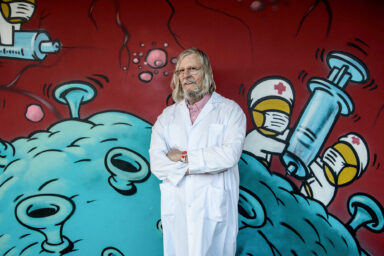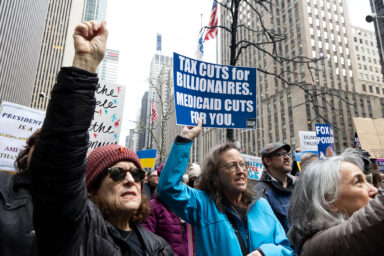WhoWhatWhy correspondent describes life in the time of coronavirus as Italy faces its “darkest hour.” Her account may be a preview of what’s to come in the US.
With the suspension of the major professional sports seasons — basketball, baseball, soccer, and hockey — as well as the eagerly anticipated “March Madness” college basketball tournament, plus the shut-down of Broadway shows and major museums and a ban on traveling from Europe, the reality of coronavirus is rapidly dawning on Americans. But what will things be like in a truly quarantined area? It’s difficult to imagine how drastically different life could be in a few weeks or even days.
However, because it is already happening elsewhere in the world, we don’t actually have to imagine it. All we need to do is hear from the people who are living this new reality.
Below you will find a no-frills account of somebody who has experienced firsthand what it is like to live in a region hit hardest by this global threat. When you read the following account, keep in mind that this scenario could come to a town or city near you in the very near future.
NORTHERN ITALY — After almost a decade working in media in London, I returned home to Italy in January to start what was supposed to be an exciting new chapter. But this anticipation was to transform into unheard-of fear and anxiety as a global pandemic invaded my homeland. Within weeks that new chapter of my life was completely rewritten — its title, in black letters, was coronavirus.
When I moved with my partner to the small town of Codogno in northern Italy, little did I know this place was going to make headlines around the world just a few weeks later. A train stop on the outskirts of the global fashion and design hub of Milan, Codogno, a friendly “smallville” of 15,000 on the plains of Lombardy, was also home to “Patient 1” — Italy’s first person to contract COVID-19 on February 18. That figure is now more than 10,000 and rising daily.
It was a Friday morning when I heard that the first case of COVID-19 — a 38-year-old worker named Mattia — was discovered in Codogno. I was in the Milan offices of the NGO where I work as a digital content specialist and the atmosphere remained nonchalant. But I decided not to return to my new home. I called my father to reassure him and told him I would spend the weekend with him and my sister at their house in Erba, north of Milan, not far from Lake Como in the foothills of the Alps. My colleagues and I casually speculated about the fate of the man who had caught the virus, and we imagined what it would be like if the whole town had to be quarantined. It was a remote possibility for us: almost a joke, something you only see in movies — or in China.
Two days later that joke became a reality. Codogno and other nearby towns were declared “red zones.” Residents were not allowed to leave, and confusion and panic began to spread, along with the virus.
The whole town shut down, the cobbled piazzas were empty, trains heading for Milan hurtled passed deserted platforms at the station without stopping, supermarket shelves were emptied, and the churches were silent as the devout stayed home. Some even fled from the red zones to rejoin their families in other parts of Italy, often carrying the virus with them. Journalists rushed to the closest areas for live broadcasts, immortalizing scenes of cars being stopped by security forces and people talking across roadblocks.
I was marooned. I could not return to Codogno. At my parents’ house, I followed government advice and put myself in self-isolation for two weeks. Initially, I wasn’t worried that I might have caught the virus — I did not know the infected man and I had been living quietly since my return to Italy and rarely went out in Codogno.
Developing a routine helped me cope with the self-imposed quarantine. I would exercise for 40 minutes in the morning, have breakfast, watch the news, and then work remotely. In the evening I would cook a vegan dinner of mushroom risotto, read a novel, and binge-watch a British gangster series I had recently discovered, Peaky Blinders.
But the panic around me was growing. Sleeping became a trial as fear of the growing enormity of the coronavirus fear encroached. I became scared of waking up to even more terrible news that someone I knew had joined the growing lists of the stricken. Friends would phone me up telling me what to do and not to do; everybody offered (uninvited) advice. Even friends of friends felt it was their place to check whether I had called the doctors to inform them of my movements and previous whereabouts.
I began to feel controlled. Anxiety and a sense of guilt permeated all my thoughts: What if I had contracted the virus and infected people during my journey to my parents’ house? What if my family had contracted it?
As days went by, I began to feel claustrophobic and depressed. When I woke up in the morning, the idea that I could not leave the house was a heavy weight on my chest. I could go out for a walk, the doctor had said (I did finally call him), but I preferred not to. People from Codogno were being shunned, and word spreads fast in Italy’s small towns.
When the self-isolation period ended, my negative feelings dissipated. My partner and I reunited briefly. We did not kiss or hug; we ordered food and went for a quick hike to the mountains the morning after. I felt reinvigorated and a return to normalcy comforted me.
Confident that the restrictions in the red zones would be soon be lifted, I started calling my friends to organize a small get-together for my birthday.
In reality, my country was falling to its knees.
That same weekend, the whole region of Lombardy became a red zone, only for the restrictions to be imposed on the whole country a few days later.
From Just a Flu to a Nationwide Lockdown
Italy has never been this quiet.
Its most iconic streets and squares are deserted; subways and trains are no longer crowded; restaurants and pubs are nearly empty; gyms, cinemas, nightclubs, theaters, and churches are temporarily closed; and tourists have fled en masse.
More than 800 people have died and 10,000 have contracted COVID-19. Italy is battling to halt the spread, but it is also fighting its personal battle: ensuring citizens will follow the new measures imposed in the whole peninsula, now a “protected area.”
People are allowed to go out only for serious work and family-related matters, or to buy food and medicines, and must carry with them a certificate declaring the reason for leaving their homes. Public gatherings are banned, sporting events are suspended, and schools and universities are closed until April 3. Citizens are advised against meeting in public places — no more dinners, no more aperitivos, “no more nightlife,” as Italy’s Prime Minister, Giuseppe Conte, put it when he announced the new measures.
Although areas of the country are empty and silent, hordes of defiant youths have gathered to eat and drink together in bars and restaurants — that were open between 6 AM and 6 PM — and continued to organize parties, refusing to change their habits. They refused to even observe the one-meter rule when in public places.
The fact that the virus is growing exponentially in Italy did not affect their bravado, their hedonism in the face of death; however, new extreme restrictions announced on Wednesday night will. The government ordered all shops, bars, and restaurants across the country to close as the death toll from the outbreak rose by 31 percent in the space of 24 hours to a total of 827.
#IoStoaCasa — I stay at home — is spreading on social media, where people urge youths to follow rules and stay indoors. Even Conte, when announcing the new measures, said the new decree could be summarized with: “Io sto a casa.”
Careless youths are not the only problem. Panicking people who continue to stockpile foods, water, toilet paper, and hand sanitizer — despite authorities’ calls not to do so — have been crowding supermarkets all over the country. The latest decree sparked another wave of panic buying.
A Divided and Isolated Nation
We are the worst-hit country after China; we have been completely isolated by other nations and we are the only country in the world to have been completely red-zoned.
Stringent measures are necessary, but they come with a lot of confusion.
The police are patrolling the streets and people caught out for no valid reason will be fined and can face up to three months in jail — yet until Wednesday restaurants and pubs remained open, public transport is still running, and no one knows how exactly security checks will be implemented.
Authorities have been giving conflicting messages and people are slowly losing faith in the institutions of this country.
Initially, politicians minimized the situation: they told us we should be cautious, but we should not panic. In a televised speech three weeks later, Conte said “there is no time left.” Similarly, Maria Rita Gismondo — head of clinical microbiology, virology, and diagnostics at the Sacco hospital in Milan, a respected institution that is currently bearing the brunt of the outbreak in northern Italy — publicly said that people were overreacting and that COVID-19 is just slightly more problematic than the seasonal flu.
The number of people requiring intensive care is increasing by the hour. The healthcare system is collapsing in Lombardy: doctors and nurses are exhausted, and depleted medical equipment means that people who need intensive care (not only those who contracted COVID-19) will be treated only if they have a good chance of surviving.
When the first decree announcing restrictions in Lombardy was due to be announced, a draft was leaked to the press prompting thousands of people to board trains late at night so they could be reunited with their families in the south, spreading the virus even further and increasing tensions among the regions.
Leaders have been calling for unity, but the whole country is divided. Southerners, historically stigmatized and discriminated against by the northerners, are now angry at the northerners due to fears the virus could spread even further.
People who have traveled for work or personal reasons are now stuck and separated from their families. I have not seen my mother in more than a month — she had traveled to Calabria to tend to my sick grandmother (who fell ill prior to the coronavirus outbreak) and has not been able to come back since.
Riots in jail have added to the confusion and instability. No one had thought about the safety of inmates, who began protesting when authorities suspended family meetings. Seven people died, some inmates escaped, and their families took to the streets to protest being denied entry. In Milan, some detainees set fire to a cell block.
Fears are running high in Italy, where the virus is uncovering old divisions and bringing to light several underlying issues my country has not dealt with in many years: disputes among regions, overcrowded prisons, an underfunded healthcare system, and a weak social safety net that does not pay sick leave to those who are self-employed or are unable to work from home. These people are struggling to make ends meet.
I have not been able to return to my home in Codogno for the past three weeks. My family and I stay home, glued to the TV every evening to check the latest developments, the death toll declared by the Civil Protection, and the possible announcement of new measures. This is our ritual. No one makes plans, no one thinks too much ahead. In a sense, it feels liberating, having to only worry about the day ahead.
Amid all this chaos, fear, and uncertainty, good news trickles in. More than 700 people have overcome the virus. “Patient 1” from Codogno has been moved out of intensive care, the spread is slowing in China, and the Italian towns initially put on lockdown are showing signs of progress, raising hopes that strict measures are keeping people from contracting the virus. A new slogan has started to be shared to boost morale: “Andra tutto bene” — everything will be all right.
In an interview last week, Conte quoted Winston Churchill and talked about Italy’s confronting “its darkest hour,” but he added that “we will make it.”
We will, as long as citizens comply with the new measures, and other nations follow suit.
Related front page panorama photo credit: Adapted by WhoWhatWhy from Arbalete / Wikimedia.



